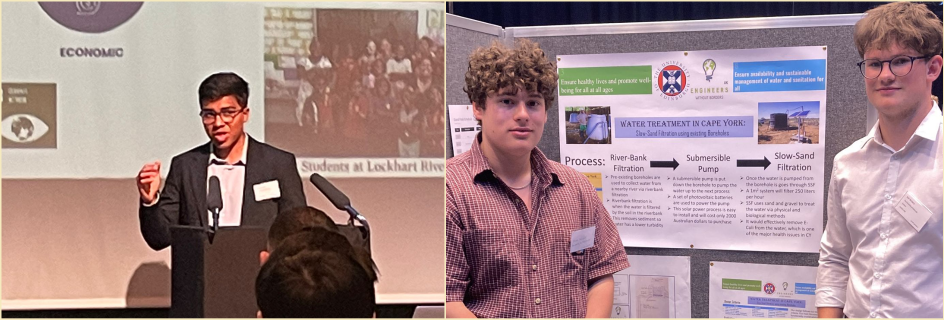Post date:
Congratulations to first year engineering students Omar Sharkas, Mukhil Ramesh, Keir Barbary and Oliver Fairfoot, who reached the grand finals of this year’s Engineering for People Design Challenge.
Organised by Engineers without Borders UK, the annual initiative is part of the School’s revamped first year engineering curriculum and encourages students across the UK and Ireland to work in multidisciplinary teams to solve problems faced by communities around the world.
This year’s design remit challenged competitors to come up with solutions to problems faced by Aboriginal and Torres Strait islanders living in Cape York, Australia, in areas including food and land management, transport, energy, built environment, water sanitation, and waste.
Omar, Mukhil, Keir and Oliver formed two separate teams, and beat competition from around 8,000 students to reach the finals.
Selection and pitches
All first year engineering students in our School participated in the competition as part of their degree studies. First, the students formed small teams and chose an angle to focus on. Then they worked together to create a solution before presenting it through a written or video report to their classmates and teachers.
Five of the best projects were put forward to Engineering without Borders UK, who were so impressed with the quality of our students’ projects that they selected two teams – rather than the usual one per university - to pitch their ideas at this year’s grand final at the PEARL, UCL in London.
Omar and Mukhil made it to the next stage of the event, where the 36 finalist teams were then whittled down to six. Here Omar pitched his team’s ideas to over 150 fellow competitors and a panel of judges from leading engineering bodies, universities, and non-profit organisations.
Here are more details about the teams' designs.
Solving water and energy challenges
Omar and Mukhil came up with a pumped hydroelectric energy storage system to generate and store energy at the same time as collecting water, solving both energy and water challenges for communities in Cape York.
At the moment, these communities rely on energy produced by unsustainable diesel generators, which are damaging to the environment and expensive to run. With no method to store energy, communities in the area cannot expand their existing solar power production capacity, limiting their access to electricity. Their water needs are also increasing at a rate which cannot be met by current rain harvesting techniques, leading to water shortages.
In response, Omar and Mukhil created an automatic energy production, energy storage and water harvesting system to give people access to more energy, more water and more opportunities.
The team’s design was a fully automatic system that uses excess energy to pump water to a high elevation water tank, and back down again when energy levels decrease. The tank coverings are shut during heatwaves to prevent water evaporation and opened when it rains to collect water. The team used professional CAD software and electronic simulation and programming to design the system.
Omar explained:
Improving water filtration for remote communities
Keir and Oliver chose to focus on water and sanitation, and designed a water filtration system to improve water quality for communities living in very remote areas, with a maximum of five households.
Currently, these communities have extremely unreliable water supplies, which are prone to being contaminated or destroyed by extreme weather events such as flooding. There is also a high risk of bacteria such as E-Coli existing in these water sources.
Keir and Oliver created a system which uses multiple stages of filtration to remove all pathogens and bacteria, and is also resistant to contamination or damage. It uses solar power so that it is cheap to run as well as sustainable.
The pair said:



